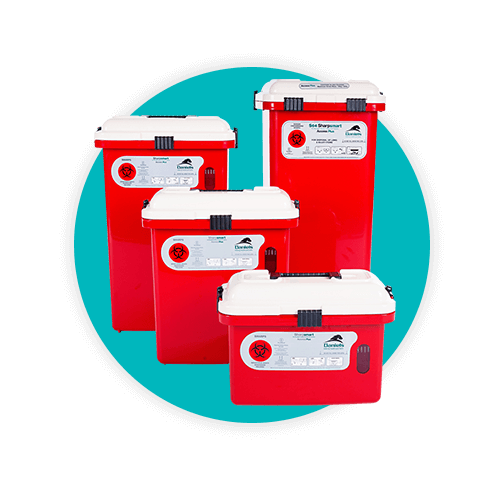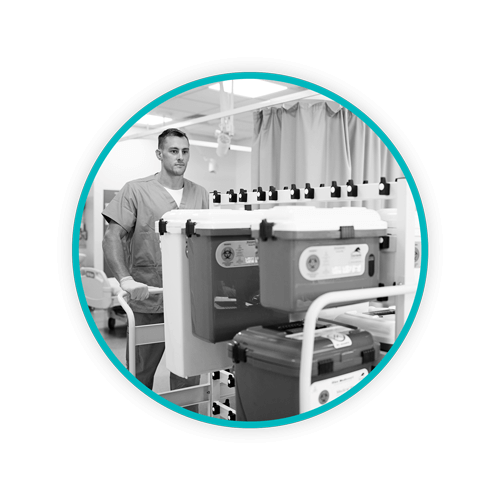Connecticut Medical Waste Disposal Services
Daniels Health is the leading expert in compliance, clinical containment and environmentally responsible waste management services. Transparent pricing, customized scheduling, immediate cost reduction.
The Daniels Difference
- We provide medical waste containers designed by clinicians for clinicians!
- All containers sanitized through a world-leading robotic washing / decontamination process.
- It is our drivers and our trucks that will service your facility, no third party hauler risk
- We areup front with our costs and transparent with our contracts
- Scheduling that supports your practice – you pay only for what you need
- Eliminate disposal-related needlestick injuries with our advanced sharps safety systems
- Eliminate the purchase, disposal costs and landfill of one-time-use disposable containers
Solutions
- Regulated Medical Waste Services
- Biohazardous Sharps Services
- Pharmaceutical Waste Services
- Chemotherapy and Hazardous Waste Services
- Onsite and online compliance and education
Eliminate red bags
That’s right. No more leakage, no unsightly cardboard boxes. We’re taking medical waste management up a notch.
Once upon a time, medical waste in the United States was given the nickname “red bag waste”, but thankfully the myth that bags are an acceptable containment for infectious waste, is now quickly dissolving. At Daniels, we believe in a world where medical waste containers are designed to an adequate standard of safety that contamination risks, leakage and infection transfer are no longer talking points. Medismart, our industry leading bagless solution for medical waste, has been proven to reduce waste volumes by up to 65%, reduce overall costs, and eliminate common healthcare waste-associated risks.
Sharpsmart. World Leading Sharps Safety Technology
Peer reviewed in four independent studies, clinically proven to reduce needlestick Injuries by up to 87%, and relied on by healthcare facilities around the world, the Sharpsmart system is driven by a single objective – To Save Lives. Designed with 13 safety features, manufactured with needle-impenetrable plastic, a gravity balanced safety tray for risk-free sharps disposal, and a built-in overfill protection mechanism, the Daniels Sharpsmart is the most advanced sharps container system in the world.
Dramatically reduced infection transfer risk
Using a foot-pedal opening mechanism and bagless system means hand contact with the container is no longer required.
This no-touch alternative results in a dramatic reduction in the infection transfer risk that currently exists using standard medical waste containers. The Medismart reusable system ensures that once full, each container is removed from your premises, emptied, and then subjected to a rigorous 6-stage robotic wash and sanitization process that eliminates challenge organisms and proves a 106 Log reduction in bacterial load.
Pharmasmart, secure pharmaceutical waste
This solution protects staff and facilities in the collection of expired drugs and pharmaceuticals.
The Pharmasmart system sets a new industry benchmark for secure pharmaceutical waste management. It mitigates unnecessary risks in the containment and disposal of non-hazardous pharmaceuticals. The Pharmasmart delivers absolute security in pharmaceutical waste disposal.
How We Serve You
Across 6 countries, Daniels has become a brand name synonymous with healthcare innovation and service
In 40 years Daniels have become experts in delivering solutions for the niche requirements of healthcare. Today over 125,000 services are fulfilled annually across the United States by Daniels owned and operated fleet. From small practices to large medical facilities, our scalable business model ensures that every customer receives:
- Timely scheduled services with clear transparent communication
- Minimum disruption to patient care
- Safety and Security underpinning all biohazardous waste handling practices
- A positive and friendly customer experience
- Cost-effective customized solutions that guarantee efficiencies and maximize savings
Let's Talk!
Your time is valuable, and we don’t want to play hard to get. You can either phone us directly on the details listed on our contact page, or feel free to fill out this short form and one of our team members will get back to you as quickly as possible.


